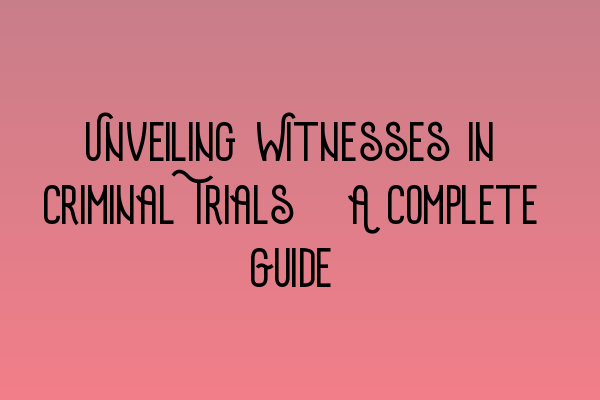Unveiling Witnesses in Criminal Trials: A Complete Guide
Welcome to SQE Criminal Law & Practice Law UK! In this comprehensive guide, we will delve into the crucial aspect of unveiling witnesses in criminal trials. Witness testimony is a fundamental part of the judicial process, and understanding how to effectively handle witnesses is paramount to building a strong case. So, let’s dive in!
What Is a Witness?
A witness is an individual who has firsthand knowledge or information relevant to a criminal case. Witnesses can provide testimony regarding the events that took place, identify the individuals involved, and offer insight into the circumstances surrounding the alleged crime.
When it comes to criminal trials, witnesses play a pivotal role in presenting evidence and helping the jury or magistrate make an informed decision. Their testimony can significantly impact the outcome of a case.
Types of Witnesses
There are various types of witnesses that may be called upon in a criminal trial. These include:
- Eye Witnesses: These are individuals who have personally witnessed the alleged crime taking place.
- Character Witnesses: These witnesses testify about the defendant’s character and reputation in the community.
- Expert Witnesses: These witnesses possess specialized knowledge or expertise in a particular field and provide professional opinions or analysis related to the case.
- Hostile Witnesses: These witnesses exhibit animosity towards the attorney who called them, making their testimony challenging.
Each type of witness brings a unique perspective and set of skills to the trial, and it is crucial for the legal team to approach and question them appropriately.
Preparing Witnesses
The success of a witness’s testimony relies heavily on thorough preparation. As a solicitor, it is essential to ensure that your witnesses are well-prepared and familiar with their role in the trial.
First and foremost, gather all necessary information from the witnesses, including their personal details, their relationship to the case, and any potential biases they may have. This will help in strategizing your questioning approach.
Next, conduct practice sessions with the witnesses, simulating the trial environment. This will help them become comfortable with the courtroom setting and build confidence in delivering their testimony effectively. Utilize SQE 1 Practice Mocks FLK1 FLK2 to provide realistic practice scenarios.
During preparation, ensure that the witnesses are fully aware of the legal requirements surrounding their testimony, including the importance of honesty, clarity, and avoiding speculation or assumptions. Provide guidance on how to respond to cross-examination and potential challenges from the opposing counsel.
Effective Questioning Techniques
As a solicitor, you must employ effective questioning techniques to elicit valuable information from witnesses. Here are a few key techniques:
- Open-Ended Questions: These questions encourage witnesses to provide detailed answers rather than simple “yes” or “no” responses.
- Leading Questions: These questions subtly guide witnesses towards a specific answer, often used during cross-examination to challenge the credibility of a witness.
- Repetition and Recapitulation: Repeating important points or summarizing testimony can help emphasize key details in the minds of the jury or magistrate.
Adopting a strategic approach to questioning witnesses is crucial in presenting a coherent narrative and establishing the credibility of your case.
Challenges with Witness Testimony
Witness testimony is not without its challenges. It is important to be aware of potential issues that may arise, such as:
- Memory Bias: Witnesses may have imperfect memories or be influenced by external factors, leading to inconsistencies or inaccuracies in their testimony.
- Hostile Witnesses: As mentioned earlier, hostile witnesses can pose challenges due to their animosity towards the attorney or party that called them.
- Witness Intimidation: Witnesses may feel threatened or fear retaliation, which can impact their willingness to testify truthfully.
As a solicitor, it is your responsibility to navigate these challenges, address them in court, and present the most reliable and persuasive testimony available.
Conclusion
Unveiling witnesses in criminal trials is a complex and critical task for every solicitor. By understanding the different types of witnesses, preparing them thoroughly, utilizing effective questioning techniques, and addressing any challenges that may arise, you can enhance the strength of your case and increase the chances of a favorable outcome.
For further resources and preparation courses for the Solicitors Qualifying Exam (SQE), please visit our related articles:
- SQE 1 Practice Exam Questions
- SQE 2 Preparation Courses
- SQE 1 Preparation Courses
- SRA SQE Exam Dates
We hope this guide has provided you with valuable insights into the world of witnesses in criminal trials. If you have any further questions or need legal assistance, do not hesitate to contact SQE Criminal Law & Practice Law UK.
